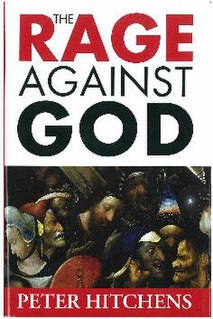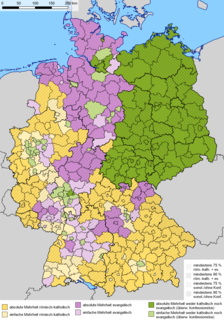
State atheism is the incorporation of positive atheism or non-theism into political regimes. It may also refer to large-scale secularization attempts by governments. It is a form of religion-state relationship that is usually ideologically linked to irreligion and the promotion of irreligion to some extent. State atheism may refer to a government's promotion of anti-clericalism, which opposes religious institutional power and influence in all aspects of public and political life, including the involvement of religion in the everyday life of the citizen. In some instances, religious symbols and public practices that were once held by religion were replaced with secularized versions. State atheism can also exist in a politically neutral fashion, in which case it is considered as non-secular.

Samuel Benjamin Harris is an American philosopher, neuroscientist, author, and podcast host. His work touches on a range of topics, including rationality, religion, ethics, free will, neuroscience, meditation, psychedelics, philosophy of mind, politics, terrorism, and artificial intelligence. Harris came to prominence for his criticism of religion, and Islam in particular, and is known as one of the "Four Horsemen" of New Atheism, along with Richard Dawkins, Christopher Hitchens, and Daniel Dennett.
Atheism is in the broadest sense a rejection of any belief in the existence of deities. In a narrower sense, atheism is specifically the position that there are no deities and any statements to the contrary are false ones. The English term 'atheist' was used at least as early as the sixteenth century and atheistic ideas and their influence have a longer history.
Antireligion is opposition to religion. It involves opposition to organized religion, religious practices or religious institutions. The term antireligion has also been used to describe opposition to specific forms of supernatural worship or practice, whether organized or not. The Soviet Union adopted the political ideology of Marxism–Leninism and by extension the policy of state atheism which opposed the growth of religions.

Religion in Egypt controls many aspects of social life and is endorsed by law. The state religion of Egypt is Islam. Although estimates vary greatly in the absence of official statistics. Since the 2006 census religion has been excluded, and thus available statistics are estimates made by religious and non-governmental agencies. The country is majority Sunni Muslim, with the next largest religious group being Coptic Orthodox Christians. The exact numbers are subject to controversy, with Christians alleging that they have been systemically under-counted in existing censuses.

The God Delusion is a 2006 book by British evolutionary biologist, ethologist Richard Dawkins, a professorial fellow at New College, Oxford and, at the time of publication, the Charles Simonyi Chair for the Public Understanding of Science at the University of Oxford.

Discrimination against atheists, both at present and historically, includes persecution of and discrimination against people who are identified as atheists. Discrimination against atheists may also comprise negative attitudes, prejudice, hostility, hatred, fear, or intolerance towards atheists and atheism. Because atheism can be defined in various ways, those discriminated against or persecuted on the grounds of being atheists might not have been considered atheists in a different time or place. Thirteen Muslim countries officially punish atheism or apostasy by death and Humanists International asserts that "the overwhelming majority" of the 193 member states of the United Nations "at best discriminate against citizens who have no belief in a god and at worst can jail them for offences dubbed blasphemy".

Christian atheism is a form of Christianity that rejects the theistic claims of Christianity, but draws its beliefs and practices from Jesus' life and teachings as recorded in the New Testament Gospels and other sources.
Atheism, in the broadest sense, is an absence of belief in the existence of deities. Less broadly, atheism is a rejection of the belief that any deities exist. In an even narrower sense, atheism is specifically the position that there are no deities. Atheism is contrasted with theism, which in its most general form is the belief that at least one deity exists.

Atheism, agnosticism, scepticism, freethought, secular humanism or general irreligion are increasing in Australia. Post-war Australia has become a highly secularised country. Religion does not play a major role in the lives of much of the population.
Postchristianity is the situation in which Christianity is no longer the dominant civil religion of a society but has gradually assumed values, culture, and worldviews that are not necessarily Christian. Post-Christian tends to refer to the loss of Christianity's monopoly in historically Christian societies.
The term New Atheism was coined by the journalist Gary Wolf in 2006 to describe the positions promoted by some atheists of the twenty-first century. New Atheism advocates the view that superstition, religion and irrationalism should not simply be tolerated. Instead, they should be countered, criticized, and challenged by rational argument, especially when they exert undue influence, such as in government, education, and politics. Major figures include Richard Dawkins, Sam Harris, Christopher Hitchens and Daniel Dennett—collectively known as the "Four Horsemen", and Ayaan Hirsi Ali, known as the "plus one horse-woman".

The Rage Against God is the fifth book by Peter Hitchens, first published in 2010. The book describes Hitchens's journey from atheism, far-left politics, and bohemianism to Christianity and conservatism, detailing the influences on him that led to his conversion. The book is partly intended as a response to God Is Not Great, a book written by his brother Christopher Hitchens in 2007.

Atheist Manifesto: The Case Against Christianity, Judaism, and Islam is a 2005 book by French author Michel Onfray. According to Onfray, the term "athéologie" is taken from a project of a series of books written and compiled by Georges Bataille under the vocable La Somme athéologique, which was ultimately never completed.
Irreligion in the United Kingdom is somewhat less prevalent than in most of Europe, with about 8% indicating they are atheistic. A third of Anglicans polled in a 2013 survey doubted the existence of God, while 15% of those with no religion believed in some higher power, and deemed themselves "spiritual" or even "religious."

Irreligion is prevalent in Germany. Following near universal adoption of Christianity, religious traditions in Germany were weakened by the rule of the Nazi Party during World War II and the subsequent rule of the Socialist Unity Party in East Germany during the Cold War. As of 2021, approximately 42% of Germans are irreligious, with a significantly higher concentration of irreligious citizens in East Germany. Eastern Germany, which was historically Protestant, is perhaps the least religious region in the world.

Irreligion in Egypt is controversial due to the largely conservative nature of the country and the religious establishments in the country. It is difficult to quantify the number of atheists or agnostics in Egypt, as the stigma attached to being one makes it hard for irreligious Egyptians to publicly profess their views and beliefs.
Anti-Christian sentiment or Christophobia constitutes opposition or objections to Christians, the Christian religion, and/or its practices. Anti-Christian sentiment is sometimes referred to as Christophobia or Christianophobia, although these terms actually encompass "every form of discrimination and intolerance against Christians", according to the Council of European Episcopal Conferences.











